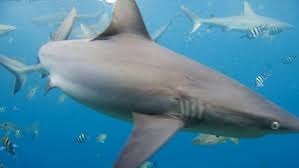Sharks have a reputation for having voracious appetites, but a new study shows that most coral reef sharks eat prey that is smaller than a cheeseburger.
Researchers Studies examined stomach contents of reef sharks and conducted chemical analyses of shark body tissue to find out what they had been eating.
Lead author, Dr Ashley Frisch said that after pumping a shark’s stomach to identify the contents of its last meal, the most common thing to find was in fact, nothing.
“We were surprised to find a broad range of small prey items such as fish, molluscs, sea snakes, crabs and more often than not, nothing at all.”
“These results suggest that reef sharks eat small meals infrequently and opportunistically,” Dr Frisch said.
To understand what the sharks were eating over longer periods, the researchers analysed shark body tissue.
“Although black-tip, white-tip and grey reef sharks have long been thought of as top predators, we found that the chemical structure of the sharks’ body tissue actually matched closely with that of large reef fishes such as groupers, snappers and emperors,” Dr Frisch said.
“This result tells us that reef sharks and large fishes have a similar diet, but they don’t eat each other. So rather than eating big fish, reef sharks are eating like big fish.”
Understanding ‘who eats who’ on coral reefs is important in helping scientists better predict how changes in one population impact another.
Co-author of the study, Dr. Justin Rizzari, said the new research changes how scientists think about food webs on coral reefs and acts as a reminder that large, conspicuous predators are not always at the top of the food chain.
“We now know that reef sharks are an important link in the food chain, but they are not the last link in the food chain. In most cases, the top predators are tiger sharks, hammerhead sharks, or people,” Dr Rizzari said.
“Coral reef ecosystems are very complex. The more we look, the more we realise that each and every species plays an important role. Sharks are no exception. They help to keep coral reefs healthy and should be managed wisely.”
Source: Science daily
N.H.Kh

